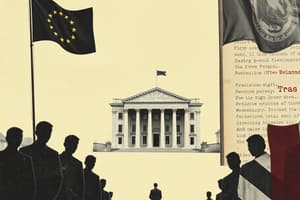Podcast
Questions and Answers
a vital international treaty that safeguards and promotes fundamental human rights and freedoms in Europe.
a vital international treaty that safeguards and promotes fundamental human rights and freedoms in Europe.
European Convention on Human Rights (ECHR)
when was the council of Europe founded?
when was the council of Europe founded?
1949
Where was the headquarters of the council of europe and When was it drafted?
Where was the headquarters of the council of europe and When was it drafted?
1950 Strasbourg, France
it is the process by which a country formally agrees to be bound by the Convention's provisions.
it is the process by which a country formally agrees to be bound by the Convention's provisions.
what is ECTHR?
what is ECTHR?
How many member states of the council of europe?
How many member states of the council of europe?
Article 2
Article 2
Article 5
Article 5
Article 8
Article 8
Article 9
Article 9
Article 10
Article 10
Article 6
Article 6
Article 6
Article 6
The principle of ____________, inherent in various articles of the ECHR (e.g., Article 14),
The principle of ____________, inherent in various articles of the ECHR (e.g., Article 14),
the ECHR does not replace national legal systems but complements them.
It allows states to handle human rights matters at the national level, only deferring to the ECHR when necessary.
the ECHR does not replace national legal systems but complements them. It allows states to handle human rights matters at the national level, only deferring to the ECHR when necessary.
is a central institution in the enforcement of the ECHR. It is based in Strasbourg, France, and serves as an international judicial body responsible for hearing cases related to alleged violations of the ECHR by member states.
is a central institution in the enforcement of the ECHR. It is based in Strasbourg, France, and serves as an international judicial body responsible for hearing cases related to alleged violations of the ECHR by member states.
Once a judgment is delivered, the Committee of Ministers of the Council of Europe oversees the implementation of the ECtHR's decisions and ensures that states comply with their obligations.
Once a judgment is delivered, the Committee of Ministers of the Council of Europe oversees the implementation of the ECtHR's decisions and ensures that states comply with their obligations.
is a separate body from the ECtHR and focuses specifically on economic and social rights. It monitors compliance with the European Social Charter, which is another Council of Europe treaty.
is a separate body from the ECtHR and focuses specifically on economic and social rights. It monitors compliance with the European Social Charter, which is another Council of Europe treaty.
The ECHR will continue to address emerging ____________, including issues related to migration, climate change, artificial intelligence, and new forms of discrimination.
The ECHR will continue to address emerging ____________, including issues related to migration, climate change, artificial intelligence, and new forms of discrimination.
The ECHR will likely explore new mechanisms to enhance compliance with its decisions, such as more effective enforcement of judgments and measures to address recalcitrant states.
The ECHR will likely explore new mechanisms to enhance compliance with its decisions, such as more effective enforcement of judgments and measures to address recalcitrant states.
Education and advocacy efforts will play a significant role in the future of the ECHR.
Education and advocacy efforts will play a significant role in the future of the ECHR.
The ECHR may increasingly serve as a platform for dialogue and cooperation among member states, civil society organizations, and other stakeholders to address complex human rights challenges collectively.
The ECHR may increasingly serve as a platform for dialogue and cooperation among member states, civil society organizations, and other stakeholders to address complex human rights challenges collectively.
Article 3
Article 3
Flashcards are hidden until you start studying
Study Notes
Council of Europe and ECHR Overview
- Established to safeguard and promote fundamental human rights and freedoms in Europe.
- Founded in 1949, with its headquarters located in Strasbourg, France.
- The European Convention on Human Rights (ECHR) was drafted in 1950.
Member States and Jurisdiction
- The Council of Europe comprises 46 member states.
- The process of ratification allows a country to formally agree to be bound by the ECHR's provisions.
European Court of Human Rights (ECtHR)
- The ECtHR acts as the central institution responsible for enforcing the ECHR.
- It hears cases concerning alleged violations of the ECHR by member states.
- After a judgment, the Committee of Ministers oversees the implementation of the ECtHR's decisions.
Articles of the ECHR
- Article 2 addresses the right to life.
- Article 3 prohibits torture and inhumane treatment.
- Article 5 protects the right to liberty and security.
- Article 6 ensures the right to a fair trial.
- Article 8 covers the right to respect for private and family life.
- Article 9 safeguards the freedom of thought, conscience, and religion.
- Article 10 protects the freedom of expression.
- Article 14 prohibits discrimination and ensures equality in rights.
Principle of Subsidiarity
- The principle of subsidiarity is inherent in various ECHR articles, allowing states to manage human rights issues nationally.
- The ECHR complements, rather than replaces, national legal systems and intervenes only when necessary.
Future Challenges for the ECHR
- The ECHR will address emerging issues such as migration, climate change, artificial intelligence, and evolving forms of discrimination.
- There is potential for new mechanisms to enhance compliance with ECtHR decisions and enforce judgments more effectively.
- Education and advocacy are essential for the ECHR's future operations.
- The ECHR may facilitate dialogue and cooperation among member states, civil societies, and other stakeholders to tackle complex human rights challenges.
Studying That Suits You
Use AI to generate personalized quizzes and flashcards to suit your learning preferences.



